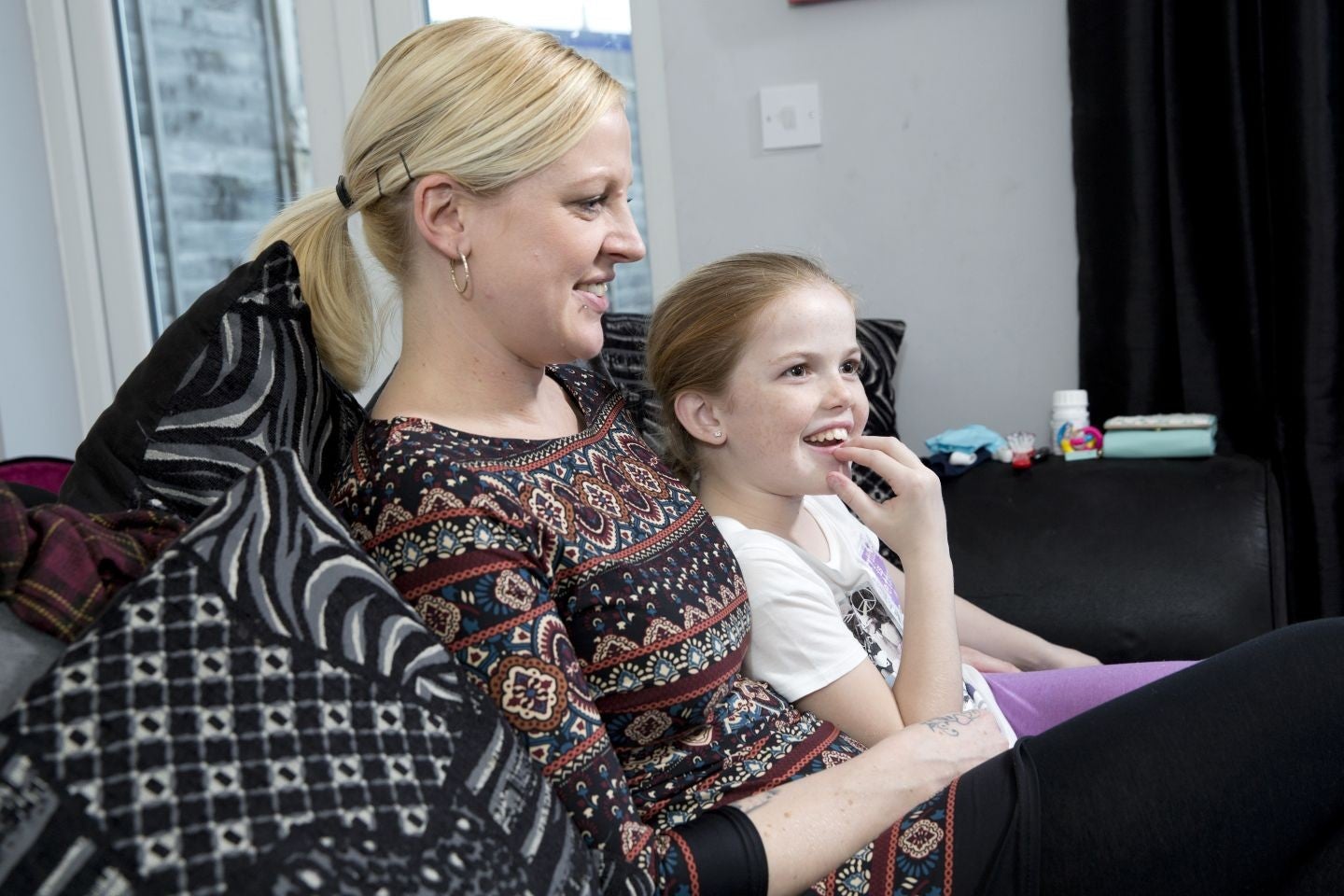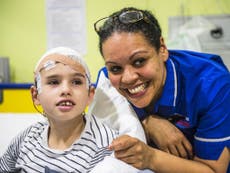Libby can be treated in her own home, thanks to GOSH’s outreach scheme
Libby was diagnosed with cystic fibrosis at birth and needs regular intravenous antibiotics and check-ups to monitor her lung function

For 10-year-old Libby Coughlan, every visit from cystic fibrosis nurse Fran Choudhry means one less journey she has to make from her home in Essex to Great Ormond Street Hospital (GOSH) in London.
Libby was diagnosed with cystic fibrosis at birth and needs regular intravenous antibiotics and check-ups to monitor her lung function. However, since last April she has been receiving much of her treatment under a GOSH scheme that sees her being treated in her own home in Basildon.
She remains under the care of GOSH but if she feels unwell, Fran or one of her team can normally be with her within 24 hours as part of a scheme designed to pick up low-level problems quickly and prevent expensive, time-consuming and exhausting trips to London.
“Since Fran started coming to us at home Libby’s health has really improved. GOSH is amazing but to have Fran nearby is brilliant. I can be in touch with her very quickly if Libby is ill,” said Libby’s mum, Gemma.
Fran is based in Essex three days a week where she works out of Mayflower Community Hospital in Billericay to support around 30 cystic fibrosis patients in the surrounding area. For the rest of the week she is based at GOSH on Badger Ward, where Libby can still be admitted if required.
“Our home visits can range from a first visit after diagnosis or a full assessment of a patient’s needs to carrying out a lung function test,” said Fran, who trained as a cystic fibrosis nurse specialist after coming to GOSH in 2013. “It’s always good to try to see a patient in their home environment when that’s possible.”
This week’s visit to Libby saw Fran clean her chest port, which is used to administer her antibiotics, and check her chest function using a breathing tube attached to a laptop. The computer has a series of child-friendly animations for Libby to concentrate on while Fran analyses her lungs.
In the past Libby would need to spend two weeks at GOSH every three months to receive IV antibiotics treatment via her chest port, but thanks to training from Fran that has been reduced to one week and Gemma can now administer the final week’s treatment at home.
“It’s a massive step forward for us,” said Gemma. “And it means we can work the treatment around school.”
The scheme in Essex is just one of more than 80 community outreach schemes that GOSH runs across the country. They offer treatment for dozens of conditions and extend the reach of the hospital well beyond the capital, including a scheme for epilepsy patients led by Professor Helen Cross.
Professor Cross, who is based at GOSH, is one of the country’s leading epilepsy experts and runs an outreach clinic in Glasgow several times a year. She also holds regular video conferences between the four paediatric epilepsy centres across the UK.
She said the scheme was not only cost-effective for the NHS but helped families avoid “time-consuming and expensive trips to London”. It also helps the joint team at GOSH and King’s College Hospital to share their expertise with doctors in Manchester, Liverpool, Birmingham and Bristol.
Elsewhere, there are GOSH-run schemes across the country for the treatment of pulmonary hypertension and paediatric multiple sclerosis. There is also a pioneering scheme to offer life-saving haemodialysis in patients’ homes across the UK.
Dr Peter Steer, chief executive of GOSH, said: “We are rarely the only organisation looking after our children. It is therefore really important that we work with clinicians closer to the child’s home to ensure that they get the right support to care for these children with complex and sometimes very rare conditions.
“Our aim is always to get a child home and help them and their families return to as normal a life as possible. These partnerships are instrumental in achieving this.”
Back in Essex, Fran has just cleaned out Libby’s port to stop the build-up of blockages. It’s unpleasant for Libby, but she prefers it to happen at home.
“I didn’t cry this time,” she said. “I do cry most of the time, but not today. It’s better to do it at home.”
Treatment: How GOSH goes the extra mile
Childhood MS
GOSH provides UK-wide support for patients suffering from paediatric multiple sclerosis. Every four months doctors from GOSH hold meetings with clinicians from Scotland and Wales to assess specific cases. GOSH has also recruited a specialist childhood MS nurse – a first in the UK.
Pulmonary hypertension
GOSH is the largest centre in Europe treating pulmonary hypertension in children and runs more than 40 clinic days annually in UK cities such as Belfast, Glasgow, Newcastle, Manchester, Leeds, Birmingham, Bristol and Southampton. Around 20 children in every million suffer from this progressive condition.
Home haemodialysis
In 2010, GOSH became Europe’s first children’s hospital to offer a portable haemodialysis service. This has allowed patients with renal failure in Southampton, Dorset and Norfolk to continue their lives while still receiving care from GOSH.
To Give to GOSH go to: http://ind.pn/1Mydxqt
To find out more about our appeal and why we're supporting GOSH go to: http://ind.pn/1MycZkr




Join our commenting forum
Join thought-provoking conversations, follow other Independent readers and see their replies